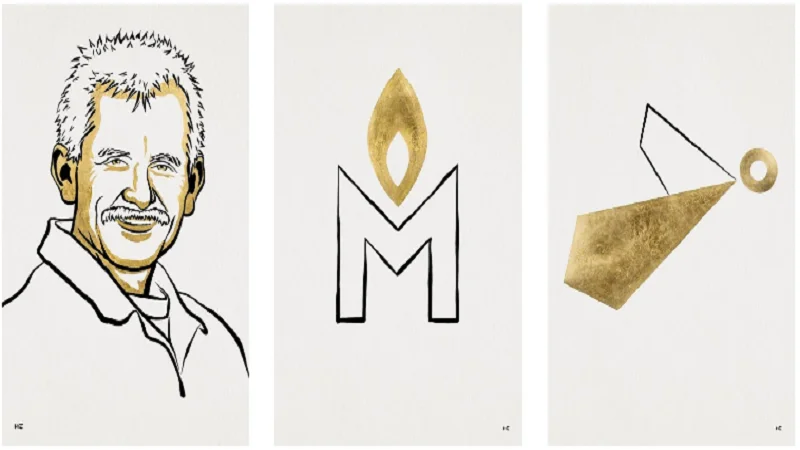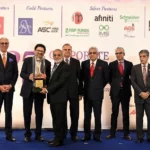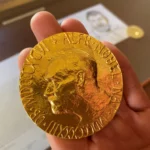The Norwegian Nobel Committee Friday decided to award the Nobel Peace Prize for 2022 to one individual and two organisations.
The committee in its press release said that the 2022 Nobel Peace Prize will be awarded to human rights advocate Ales Bialiatski from Belarus, the Russian human rights organisation Memorial and the Ukrainian human rights organisation Center for Civil Liberties.
“The Peace Prize laureates represent civil society in their home countries. They have for many years promoted the right to criticise power and protect the fundamental rights of citizens. They have made an outstanding effort to document war crimes, human rights abuses and the abuse of power. Together they demonstrate the significance of civil society for peace and democracy, it said.
Ales Bialiatski was one of the initiators of the democratic movement that emerged in Belarus in the mid-1980s. He devoted his life to promoting democracy and peaceful development in his home country.
Among other things, he founded the organisation Viasna (Spring) in 1996 in response to the controversial constitutional amendments that gave the president dictatorial powers and that triggered widespread demonstrations. Viasna provided support for the jailed demonstrators and their families. In the years that followed, Viasna evolved into a broad-based human rights organisation that documented and protested against the authorities’ use of torture against political prisoners.
Government authorities have repeatedly sought to silence Ales Bialiatski. He was imprisoned from 2011 to 2014. Following large-scale demonstrations against the regime in 2020, he was again arrested. He is still detained without trial. Despite tremendous personal hardship, Mr Bialiatski has not yielded an inch in his fight for human rights and democracy in Belarus.
The human rights organisation Memorial was established in 1987 by human rights activists in the former Soviet Union who wanted to ensure that the victims of the communist regime’s oppression would never be forgotten.
Nobel Peace Prize laureate Andrei Sakharov and human rights advocate Svetlana Gannushkina were among the founders. Memorial is based on the notion that confronting past crimes is essential in preventing new ones.
After the collapse of the Soviet Union, Memorial grew to become the largest human rights organisation in Russia. In addition to establishing a centre of documentation on victims of the Stalinist era, the Memorial compiled and systematised information on political oppression and human rights violations in Russia.
The memorial became the most authoritative source of information on political prisoners in Russian detention facilities. The organisation has also been standing at the forefront of efforts to combat militarism and promote human rights and government based on rule of law.
Read This
French author Annie Ernaux wins Nobel Literature Prize
Three scientists win Nobel Prize for click chemistry
French-US-Austrian trio win physics Nobel for quantum mechanics work
The Center for Civil Liberties was founded in Kyiv in 2007 to advance human rights and democracy in Ukraine. The centre has taken a stand to strengthen Ukrainian civil society and pressure the authorities to make Ukraine a full-fledged democracy. To develop Ukraine into a state governed by rule of law, the Centre for Civil Liberties has actively advocated that Ukraine become affiliated with the International Criminal Court.
After Russia invaded Ukraine in February 2022, the Center for Civil Liberties has engaged in efforts to identify and document Russian war crimes against the Ukrainian civilian population. In collaboration with international partners, the centre is playing a pioneering role intending to hold the guilty parties accountable for their crimes.
By awarding the Nobel Peace Prize for 2022 to Ales Bialiatski, Memorial and the Center for Civil Liberties, the Norwegian Nobel Committee wishes to honour three outstanding champions of human rights, democracy and peaceful co-existence in the neighbour countries Belarus, Russia and Ukraine.
Through their consistent efforts in favour of humanist values, anti-militarism and principles of law, this year’s laureates have revitalised and honoured Alfred Nobel’s vision of peace and fraternity between nations – a vision most needed in the world today.
Full list of Nobel Peace Prize winners
Here is the full list of Nobel Peace Prize laureates from 1901, when the prize was first awarded.
2021: Maria Ressa (Philippines/United States) and Dmitry Muratov (Russia)
2020: The UN World Food Programme (WFP)
2019: Abiy Ahmed Ali (Ethiopia)
2018: Denis Mukwege (DR Congo) and Nadia Murad (Iraq)
2017: International Campaign to Abolish Nuclear Weapons (ICAN)
2016: Juan Manuel Santos (Colombia)
2015: The National Dialogue Quartet (Tunisia)
2014: Kailash Satyarthi (India) and Malala Yousafzai (Pakistan)
2013: The Organisation for the Prohibition of Chemical Weapons (OPCW)
2012: The European Union (EU)
2011: Ellen Johnson Sirleaf and Leymah Gbowee (Liberia), Tawakkul Karman (Yemen)
2010: Liu Xiaobo (China)
2009: Barack Obama (United States)
2008: Martti Ahtisaari (Finland)
2007: Al Gore (United States) and the UN Intergovernmental Panel on Climate Change
2006: Muhammad Yunus (Bangladesh) and the Grameen Bank
2005: The International Atomic Energy Agency (IAEA) and Mohamed ElBaradei (Egypt)
2004: Wangari Maathai (Kenya)
2003: Shirin Ebadi (Iran)
2002: Jimmy Carter (United States)
2001: Kofi Annan (Ghana) and the United Nations
2000: Kim Dae-jung (South Korea)
1999: Medecins Sans Frontieres (Doctors Without Borders)
1998: John Hume and David Trimble (Northern Ireland)
1997: Jody Williams (United States) and the International Campaign to Ban Landmines
1996: Carlos Filipe Ximenes Belo and Jose Ramos-Horta (East Timor)
1995: Joseph Rotblat (Britain) and the Pugwash movement
1994: Yitzhak Rabin, Shimon Peres (Israel) and Yasser Arafat (Palestine Liberation Organization)
1993: Nelson Mandela and Frederik de Klerk (South Africa)
1992: Rigoberta Menchu Tum (Guatemala)
1991: Aung San Suu Kyi (Burma)
1990: Mikhail Gorbachev (Soviet Union)
1989: Dalai Lama (Tibet)
1988: United Nations Peacekeeping Forces
1987: Oscar Arias Sanchez (Costa Rica)
1986: Elie Wiesel (United States)
1985: International Physicians for the Prevention of Nuclear War
1984: Desmond Tutu (South Africa)
1983: Lech Walesa (Poland)
1982: Alva Myrdal (Sweden) and Alfonso Garcia Robles (Mexico)
1981: Office of the United Nations High Commissioner for Refugees
1980: Adolfo Perez Esquivel (Argentina)
1979: Mother Teresa (Albania)
1978: Anwar Sadat (Egypt) and Menachem Begin (Israel)
1977: Amnesty International
1976: Betty Williams and Mairead Corrigan (Northern Ireland)
1975: Andrei Sakharov (Soviet Union)
1974: Sean MacBride (Ireland) and Eisaku Sato (Japan)
1973: Henry Kissinger (United States) and Le Duc Tho (Vietnam, declined)
1972: prize not handed out
1971: Willy Brandt (West Germany)
1970: Norman Borlaug (United States)
1969: International Labour Organization (ILO)
1968: Rene Cassin (France)
1967: prize not handed out
1966: prize not handed out
1965: United Nations Children’s Fund (UNICEF)
1964: Martin Luther King Jr (United States)
1963: International Committee of the Red Cross and the League of Red Cross Societies
1962: Linus Carl Pauling (United States)
1961: Dag Hammarskjold (Sweden)
1960: Albert Luthuli (South Africa)
1959: Philip Noel-Baker (Britain)
1958: Georges Pire (Belgium)
1957: Lester Pearson (Canada)
1956: prize not handed out
1955: prize not handed out
1954: Office of the United Nations High Commissioner for Refugees (UNHCR)
1953: George Marshall (United States)
1952: Albert Schweitzer (France)
1951: Leon Jouhaux (France)
1950: Ralph Bunche (United States)
1949: Lord (John) Boyd Orr of Brechin (Britain)
1948: prize not handed out
1947: Friends Service Council (The Quakers), American Friends Service Committee (The Quakers)
1946: Emily Greene Balch (United States), John Raleigh Mott (United States)
1945: Cordell Hull (United States)
1944: International Committee of the Red Cross
1943: prize not handed out
1942: prize not handed out
1941: prize not handed out
1940: prize not handed out
1939: prize not handed out
1938: Nansen International Office for Refugees
1937: Viscount Cecil of Chelwood (Britain)
1936: Carlos Saavedra Lamas (Argentina)
1935: Carl von Ossietzky (Germany)
1934: Arthur Henderson (Britain)
1933: Sir Norman Angell (Ralph Lane) (Britain)
1932: prize not handed out
1931: Jane Addams (United States) and Nicholas Murray Butler (United States)
1930: Nathan Soderblom (Sweden)
1929: Frank Billings Kellogg (United States)
1928: prize not handed out
1927: Ferdinand Buisson (France) and Ludwig Quidde (Germany)
1926: Aristide Briand (France) and Gustav Stresemann (Germany)
1925: Sir Austen Chamberlain (Britain) and Charles Gates Dawes (United States)
1924: prize not handed out
1923: prize not handed out
1922: Fridtjof Nansen (Norway)
1921: Karl Hjalmar Branting (Sweden) and Christian Lous Lange (Norway)
1920: Leon Victor Auguste Bourgeois (France)
1919: Thomas Woodrow Wilson (United States)
1918: prize not handed out
1917: International Committee of the Red Cross
1916: prize not handed out
1915: prize not handed out
1914: prize not handed out
1913: Henri La Fontaine (Belgium)
1912: Elihu Root (United States)
1911: Tobias Michael Carel Asser (The Netherlands) and Alfred Hermann Fried (Austria-Hungary)
1910: Permanent International Peace Bureau
1909: Auguste Marie Francois Beernaert (Belgium) and Paul Henri Benjamin Balluet, Baron d’Estournelles de Constant de Rebecque (France)
1908: Klas Pontus Arnoldson (Sweden) and Fredrik Bajer (Denmark)
1907: Ernesto Teodoro Moneta (Italy) and Louis Renault (France)
1906: Theodore Roosevelt (United States)
1905: Baroness Bertha Sophie Felicita von Suttner (Austria-Hungary)
1904: Institute of International Law
1903: William Randal Cremer (Britain)
1902: Elie Ducommun (Switzerland) and Charles Albert Gobat (Switzerland)
1901: Jean-Henri Dunant (Switzerland) and Frederic Passy (France).


